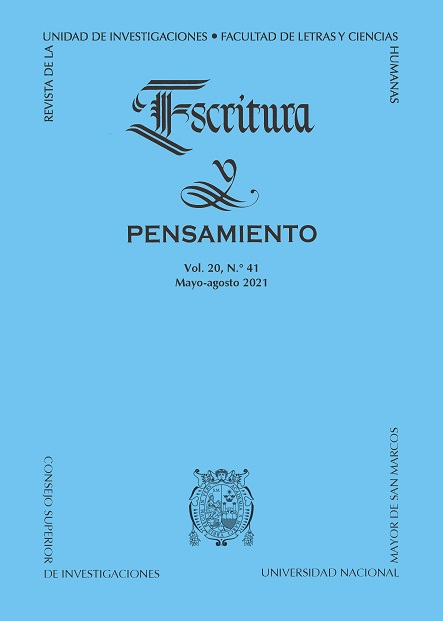Identification, memory and violence processes in the testimony of Gregorio Condori Mamani
DOI:
https://doi.org/10.15381/escrypensam.v20i41.21120Keywords:
ethnographic witness, identification processes, violence, indigenous native, migrantAbstract
This work investigates inquires into the Peruvian ethnographic testimony of Gregorio Condori Mamani. Autobiografía (1997) to analyze how the identification processes of the indigenous native migrant from the mountain ranges are built and how this construct is penetrated by a contentious heterogeneity that, in turn, is marked by a position of subordination. Besides, this work is interested in reflecting on the importance of the testimony as a text of heterogeneous nature that, from its generic condition, translates into a device that represents Latin American heterogeneity and that denounces the Western culture’s outrages against the indigenous one.
References
Altuna, E. (2008). La partida inconclusa: indigenismo y testimonio. Revista de Crítica Literaria Latinoamericana. Año 34, No. 68, pp. 121-141.
Bueno, R. (1996). Sobre la heterogeneidad literaria y cultural de Amèrica Latina. En: Mazzotti y Zevallos (coord.), Asedios a la heterogeneidad cultural. Philadelphia: Asociación Internacional de Peruanistas, pp.21-36.
Campuzano, B. (2020). Memoria y violencia en la narrativa peruana: del testimonio residual al cuento de guerra. (Tesis doctoral). Universidad Nacional de Tucumán. Salta. En evaluación.
Campuzano, B. (2016). Experiencia migratoria y tiempos heterogéneos en el testimonio latinoamericano contemporáneo. Revista de Crítica Literaria Latinoamericana. Año XLII, n°83, Lima-Boston: pp. 317-332.
Cliford, J. (1999). Itinerarios Transculturadores. Barcelona: Editorial Gedisa.
Cornejo Polar, A. (1990). Escribir en el aire. Ensayo sobre la heterogeneidad sociocultural en las literaturas andinas. Lima: Editorial Horizontes.
Cornejo Polar, A. (1982). Sobre literatura y crítica latinoamericanas. Universidad Central de Venezuela: Ed. De la Facultad de Humanidades y Educación.
Cornejo Polar, A. (1981). Literatura y sociedad en el Perú: la novela indigenista, La cultura nacional, problema y posibilidad. Lima: Editorial Lasontay.
Foucault, M. (1984). Nietzche, genealogy, history. En P. Rabinow (ed.). The Foucault Reader, Harmondsworth: Penguin.
Foucault, M. (1995). Discurso, poder y subjetividad. Buenos Aires: Ediciones El cielo por asalto.
Hall, S. (2010). Introducción: ¿quién necesita “identidad”? En Restrepo, Eduardo; Vich, Victor y Walsh Catherina (Eds.). Sin garantías: trayectorias y problemáticas en estudios culturales. Bogotá: Instituto de estudios sociales y culturales Pensar Universidad Javeriana. Quito: Instituto de Estudios Peruanos. Universidad Andina Simón Bolívar, Envión Editores.
Howarde-Malverde, R. (1997). Narraciones en la frontera: la autobiografía quechua de Gregorio Condori Mamaní y sus traducciones al castellano y al inglés. Amerindia N° 22, 63-84. En línea http://celia.cnrs.fr/FichExt/Am/A_22_05.pdf. (Fecha de consulta: 25 de agosto de 2009).
Lienhard, M. (1994). Sociedades heterogéneas y disglosia cultural en América Latina. En: Scharlau, Birgit (ed.). Lateinamerika denken. Kulturtheoretische grenzgänge zwischen. Moderne und postmoderne. Tübingen, Gunter Norr Verlag.
Mamani Macedo, M. (Julio, 2019). Yanantin: relación, complementariedad y cooperación en el mundo andino. Estudios de Teoría Literaria. Revista digital: artes, letras y humanidades. , vol. 8, n° 16, pp. 191-203.
Nofal, R. (2002). La escritura testimonial en América Latina. Los imaginarios revolucionarios del sur. 1970-1990. Universidad Nacional del Tucumán. Facultad de Filosofía y Letras. San Miguel de Tucumán.
Quijano, A. (1999). Colonialidad del poder, eurocentrismo y América Latina. En: Lander, Edgardo (comp.) La colonialidad del saber: eurocentrismo y ciencias sociales. Perspectivas latinoamericanas. Buenos Aires: CLACSO.
Rama, A. (1984). La ciudad letrada. Montevideo: Arca.
Said, E. W. (1993). Culture and imperialism. Nueva York: Vintage Books.
Sklodowska, E. (1992). Testimonio hispanoamericano. Reconstruir hechos reales Historia, teoría, poética. New York: Peter Lang.
Spivak, G. (2011). ¿Puede hablar el subalterno? Buenos Aires: El Cuenco del Plata.
Vích, V. (2001). El discurso de la calle: los cómicos ambulantes y las tensiones de la modernidad en el Perú. Lima, Red para el Desarrollo de las Ciencias Sociales en el Perú.
Williams, R. (1997). Marxismo y literatura. Barcelona: Península.
Downloads
Published
Issue
Section
License
Copyright (c) 2021 Marcia Muriel Manino

This work is licensed under a Creative Commons Attribution 4.0 International License.
AUTHORS RETAIN THEIR RIGHTS:
a. The authors retain their trademark and patent rights, and also over any process or procedure described in the article.
b. The authors retain the right to share, copy, distribute, execute and publicly communicate the article published in the Escritura y Pensamiento (for example, place it in an institutional repository or publish as part a book), with acknowledgment of its initial publication by Escritura y Pensamiento.
c. Authors retain the right to make a subsequent publication of their work, to use the article or any part of it (for example: a compilation of their work, lecture notes, thesis, or for a book), provided that they indicate the source of publication (authors of the work, journal, volume, number and date).





